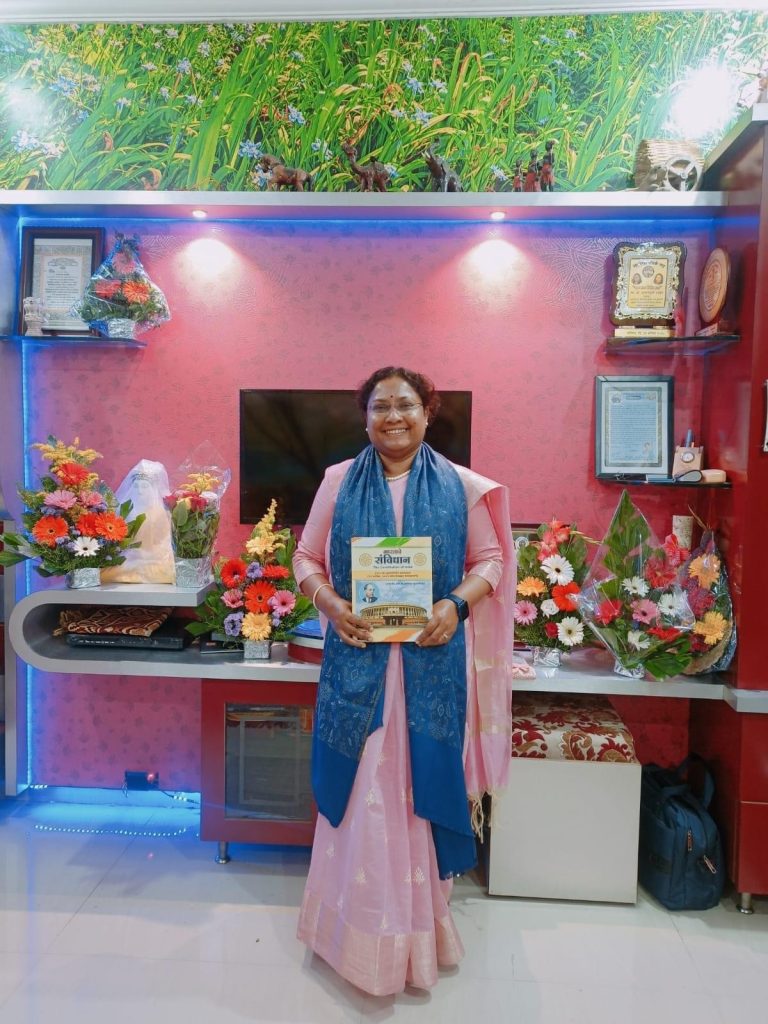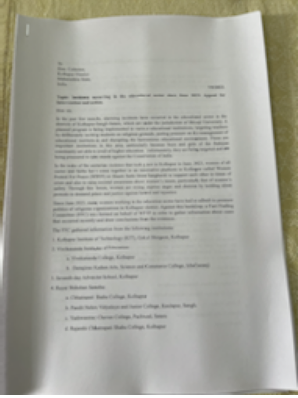How Maharashtra’s Women Academics Are Resisting The Hate Narrative
In the face of rising right-wing hostility in western Maharashtra, women academics are pushing back, asserting their right to freedom of speech
- Priyanka Tupe

Mrunalini Aaher’s phone has been inundated with hundreds of congratulatory messages and calls from across Maharashtra, celebrating her recent victory in the battle for freedom of speech. A professor of English in western Maharashtra’s Satara district, she recently won a case against the Satara police who instead of investigating right-wing youth bodies that had objected to her use of a literary reference on the grounds that it was “insulting” to Shivaji Maharaj, criminalised her.
The Bombay High Court reprimanded the Satara police for infringing on her right to free speech by taking illegal action against her, including issuing a letter to her college to initiate a departmental inquiry against her and accusing her of disrupting communal harmony. Following the court’s order, the Satara Police withdrew their action by giving a clarification letter to Aaher on September 2.

Similar events have been reported in the past year from other districts of western Maharashtra such as Sangli and Kolhapur. The pattern of these hostilities remains the same – a right-wing group enters an institution to protest, claiming to be offended by some incident. This incident could be a conversation between students and teachers on rationalism or even a recommendation to read ideologically diverse books, especially those that push secular thoughts.
The mob then surrounds the faculty, and it is often joined by parents, friends, and outsiders, thus escalating the situation. The group then pressures college managements to demand an apology from teachers and if this demand is not met the confrontation intensifies, leading to calls for disciplinary action, transfers, or even termination of service. Salokha, a Maharashtra based collective focussed on communal harmony, has documented at least a dozen such incidents in a fact- finding report.
A year ago, during a guest lecture at the Yashwantrao Chavan College in Pachwad town of Satara district, where Mrunalini Aher teaches English, the speaker Vinayakrao Jadhav referred to Shivaji Maharaj without his royal honorific. Some students, who said they found this disrespectful to the founder of the Maratha kingdom, started shouting down the speaker.
The very next day, an aggressive group of protestors – some students and some outsiders – descended on the college demanded that both Mrunalini and the principal of the college apologise for the speaker’s remarks.
“The mob was so aggressive and insistent that the principal and other staff members felt pressured to apologise, and the principal even called me,” Mrunalini recalled. “While trying to engage in a peaceful dialogue with them, I greeted them with ‘Good morning, friends’. They immediately objected, insisting I should say ‘Jai Shri Ram’ instead.”
Matters got worse when she asked the students if they had read rationalist Govind Pansare’s landmark book, Shivaji Kon Hota (who was Shivaji), where too the warrior king had been referred to by just one name.
“This enraged the crowd even more, and they continued demanding an apology from me. The Rayat Shikshan Sanstha, which manages the college and has a rich legacy of Bahujan ideology, felt helpless in the face of this mob fury, but I remained fearless. The principal apologised, but I refused to. My husband came to pick me up from the college, and I reached home safe, but that day I came dangerously close to experiencing a mob lynching,” she says, asserting her right to carry on with her campaign against what she describes as “cultural terrorism”.
This mob attack – and the manner in which it was conducted – is not an isolated incident nor is it impulsive. It is a part of a larger, premeditated campaign to stoke divisiveness in the region, said a report by a network of academics and activists, the Forum Women Protest for Peace (WPFP), or the Shantisathi Stree Sangharsh, that we will detail later. At least six such incidents have been reported in educational institutions in Kolhapur district alone, says the report, and they all show a predictable pattern where teachers are harassed for encouraging students to be progressive or secular.
In a two-part series, we report on how hate rhetoric and divisive communal campaigns are intensifying in western Maharashtra, an affluent sugar belt. This trend was already in evidence in the run-up to the Lok Sabha elections that concluded in June. And now with the state assembly elections due to be announced anytime, right wing groups are rallying again to try and polarise voters, say political and social activists.
In the first part, we examined the larger context of an emerging hate campaign in the area and the organisations that are fuelling it. In this, the second part of the series, we look at the aggressive strategy adopted by right-wing youth bodies to vilify teachers with a progressive outlook.
Arbitrary Police Action
The same day a mob descended on Yashwantrao Chavan College in Pachwad, a police officer from Satara, RS Garje, visited the college and demanded that Mrunalini render an apology. She said that when she refused, he threatened to file an FIR against her and also abused her husband, Ajit Gadhave. Mrunalini submitted a formal complaint to the Superintendent of Police in Satara, and sought assurance of her safety.
The following day, Garje returned to the college and issued a letter directing the administration to conduct a departmental inquiry against Mrunalini, accusing her of posing a threat to law and order and communal harmony. He also instructed the college to submit the inquiry report to the police station. Mrunalini challenged these actions in the Bombay High Court, which ruled in July, two months later, and also criticised the conduct of the police.
In the meanwhile, the professor had been transferred to another college in Sangli’s Vita tehsil, almost 100 km from her home. The ordeal did not end there; she was soon transferred again, to a college in Lonand in Satara. Her car was also vandalised by right wing goons while it was parked in the college campus, she alleges.
What hurt her the most, she says, was the lack of support from the college management. “My colleagues didn’t even check on me. My husband and daughter stood by me and a lawyer with Kolhapur’s Lokraja Vakil Mandal, a collective of progressive lawyers, Yuvraj Narwankar represented me in the court. I found strength from the fact that my ancestors were freedom fighters and I had grown with the progressive movement in Maharashtra,” said Mrunalini.
‘Management Intimidated By The Mob’
A woman teacher of physics at an engineering college in Kolhapur faced a similar backlash. During a ‘Value Education’ elective class, she facilitated a group discussion on social discrimination. When the conversation veered towards hate speech against Muslims fueled by fake news and narratives, the professor, who did not wish to be named, intervened. She pointed out that it is unfair to vilify one community because oppression can be perpetrated by any individual or social group based on false information.
Some students secretly recorded her comments, edited the video to make it provocative and put it out on social media. The clip went viral a week later. A mob of right wing groups landed up at the college and pressured the professor and the administration to apologise.
“The management knew I hadn’t done anything wrong, but they were intimidated by the mob. To ensure the safety of the students and avoid possible violence at the college, they asked me to apologise. I refused. The mob was dangerous, but my husband and brother came to rescue me, and I made it home safely,” she says.
She was subsequently placed on leave and forced to work from home for nearly a month until the situation calmed down.
A similar incident involving Sameena Dalwai at Jindal University in Haryana sparked controversy earlier this year. During a conversation on dating apps in her lecture, Dalwai showed some app profiles to illustrate her points. She, too, was secretly filmed, and the video, manipulated to provoke, was circulated online.
Since June 2023, numerous women academics have been targeted by these groups. Many of these institutions, affiliated to the Shivaji University, are in the Kolhapur-Sangli-Satara region. In response, a fact-finding committee was established by the Forum Women Protest for Peace (WPFP), or the Shantisathi Stree Sangharsh. This collective met with affected teachers, college managements, and administrative stakeholders, including district collectors, to discuss the problem. The WPFP also analysed information published in local newspapers and found a troubling pattern in these incidents.
Premeditated Attacks: Report
The report found six such incidents in the educational institutions of Kolhapur district, including the Kolhapur Institute of Technology in Gokul Shirgaon, Vivekanand Education Society, Seventh Day School, Rajarshi Chhatrapati Shahu College in Kolhapur, Dattajirao Kadam Arts, Science and Commerce College in Ichalkaranji, and Chandrabai Shantappa Shendure College in Hupari. Sangli reported another incident at the Pandit Nehru Vidyalaya and Junior College, and at the Yashwantrao Chavan College in Pachwad.
The report highlights key observations: “The incidents that took place between June and August 2023 in various educational institutions in Kolhapur and Sangli are not isolated occurrences. They are premeditated and exhibit a pattern of direct intervention by external elements in educational institutions. These institutions have become targets of Hindutva groups and organisations. There is a deliberate attempt to create tension and rifts along religious lines among students, their parents, and the general public by targeting educational institutions.”

Many of the teachers and activists interviewed say they are worried about this rise in provocative acts and fear that these are being fueled to create an atmosphere of anxiety in the run up to the impending state assembly polls and the Lok Sabha elections that concluded in early June.
Women’s Front Against Divisiveness
In response to these incidents, social activists and progressive academics have formed a collective called Shantisathi Stree Sangharsh (Women’s Protest for Peace). This group, founded by Shramik Foundation’s Megha Pansare, a professor of Russian at Shivaji University in Kolhapur, along with activists Meena Seshu, Rehana Mursal, Tanuja Shipurkar, Bharati Powar, Seema Patil, and Bharati Patil, includes 35 women members from Kolhapur, Satara, and Sangli.
The collective monitors these incidents, identifies patterns, meets with victims and relevant stakeholders, and prepares fact-finding reports. It also conducts silent peace marches in the city.
“We want to send a clear message to those engaging in divisive politics: we are not passive observers of these incidents. We are actively documenting and resisting them. We organised silent protests, where we stood quietly with placards and white scarves or dupattas at prominent locations in Kolhapur, to convey the message of peace,” said Megha Pansare.
WPFP activists also believe that there is to express solidarity with Muslim women as they are at the receiving end of the violence and some of the professors who have been targeted are Muslim. “We are also helping the survivors of the recent communal violence that broke out at Gajapur and Vishalgad,” said Megha.
Vishalgad in Kolhapur district is a historic fort from the Bahamani era, and it was conquered by Shivaji Maharaj. Muslim families who maintain the fort and local mosques have been living there for generations. There is now a campaign ‘Chalo Vishalgad’ to clear the encroachments in the area led mostly by right-wing Hindu youth groups. Mid-July this led to communal violence that hit over 100 families. It also impacted 46 families in Gajapur, a village at the bottom of the fort.
We believe everyone deserves equal access to accurate news. Support from our readers enables us to keep our journalism open and free for everyone, all over the world.


